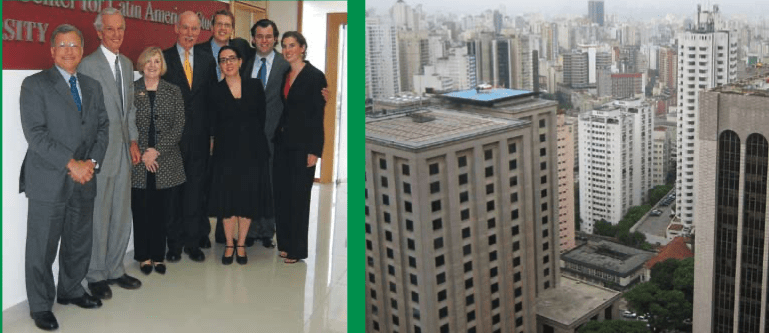Harvard and Brazil
Working Together to Make a Difference

Left-to-right: Claudio Haddad, Jorge Paulo Lemann, Merilee Grindle, Kenneth Maxwell, Jason Dyett, Lorena Barberia, Tomás Amorim, and Erin Goodman.
Since our founding in mid-2006, the Brazil Studies Program at Harvard’s David Rockefeller Center for Latin American Studies (DRCLAS) and the University’s Brazil Office have worked hand-in-hand with the goal of enhancing collaborative research and learning among Harvard faculty and students and their Brazilian counterparts. While our journey has just begun, the conditions for true two-way Harvard-Brazil collaborations have significantly improved over the past year.
From a historic perspective, expanding the international horizons of students and professors while they are at Harvard has climbed the list of institutional priorities relatively recently. Areas studies centers, aimed largely at increasing teaching and learning opportunities at the University, have emerged over the past fifty years, working to increase the knowledge of and exposure to foreign cultures at Harvard.
DRCLAS is the most recent of Harvard’s area studies centers, founded in 1994.
Opportunities for two-way international collaborations that recognize important cultural and contextual differences have recently received a further boost through the establishment of a handful of Harvard international offices. In this important area, Brazil (and Latin America as a whole) has been transformed from laggard to leader. Three of the University’s international offices are located in the region: the Harvard Business School’s Latin America Resource Center in Argentina (established in 2000), the DRCLAS Regional Office in Chile (2002) and the recently-launched Brazil Office, which was established through the generous support of Jorge Paulo Lemann in June 2006 to serve the University across disciplines and throughout the country.
Harvard’s Brazil Studies Program and Brazil Office are best viewed as one integrated entity that is made up of interdependent parts. Maintaining two-way collaboration between the Brazil Studies Program in Cambridge and the Brazil Office in São Paulo is vital to our ability to identify, initiate and nurture equitable Harvard-Brazil collaborations. Strong Harvard faculty engagement in Brazil is required if the Brazil Office is to be successful.
The Brazil Studies Program in Cambridge, however, is best positioned to help make this happen thanks to Kenneth Maxwell’s experience, leadership as its director and the impressive and active multi-disciplinary Brazil Faculty Advisory Committee that the Program has assembled. A steady and increasing flow of Brazilian professors and students to Harvard is, on the other hand, vital to the success of the Brazil Studies Program. The Brazil Office, thanks to regular face-to-face interactions with Brazilian professors and students and an extraordinary local Brazil Advisory Group has a clear advantage in identifying promising opportunities for collaborative research and learning opportunities in the country. We are, and should be, co-dependent.
In the past months, the Brazil Studies Program and Brazil Office team has been delighted to learn of and support numerous Harvard-Brazil collaborations, many of which appear in this issue of ReVista. Efforts to strengthen Harvard-Brazil engagement span across disciplines and include a range of faculty, fellows and students—from American professors with no prior exposure to Brazil, to Brazilian doctoral and graduate students at Harvard, to professors who have strong existing links with Brazil or are planning sabbaticals in the country.
The Brazil Studies Program is committed to building on our initial success increasing faculty engagement in Brazil. Alexander Keyssar, Professor at Harvard’s Kennedy School of Government (KSG), came to Brazil for the first time in mid-2006 to co-teach a one-week U.S. studies seminar in Campinas. Following a rich exchange and positive initial experience, he has returned to Brazil multiple times and engaged with Brazilian professors at the University of São Paulo’s (USP) Institute for Advanced Studies, the Braudel Institute at the FAAP (which will soon launch Brazil’s first U.S. Studies Center) and members of our Brazil-based Advisory Group. In the future, Keyssar plans to deepen his Brazil engagement through a Senior Fulbright grant that would allow him to spend more than a month in Brazil.
In a recent trip to Brazil that was made possible with the help of the Brazil Office, Harvard Business School (HBS) Professor Aldo Musacchio secured nine interviews with prominent Brazilian business and political leaders. His field research, which included interviews with the head of the main workers union (CUT), former ministers of finance and education and a leader of the MST landless movement, has accelerated and enriched a case study that he is authoring on the current state of Brazil’s economy and the impact that inequality has on the business environment. The case will be part of a required MBA course on business, government and international economy. Scot Martin, Professor of Environmental Chemistry, provides a third important example of our efforts to build and support enduring and high-impact research collaborations. Martin, who is engaged in a research project on the impact of humans in the Amazon and will spend a semester in 2008 in Brazil, with funding from the Brazil Studies Program and on-the-ground support from the Brazil Office to increase the visibility and impact of his collaborative work.
Frequent interaction with Harvard’s doctoral, graduate and undergraduate students has opened exciting new possibilities for us, for them and for their Brazilian counterparts. Felipe Fregni, an Instructor at Harvard Medical School and a member of the first class of Lemann Fellows, for example, has worked extremely closely with the Brazil Studies Program and Brazil Office. Our ongoing work with Felipe targets the creation of a new fieldtrip course on infectious diseases that will bring 15 Harvard School of Public Health students to Brazil, pair them with an equal number of Brazilian students from the Santa Casa de São Paulo Medical School and foster stronger ties between the professors from both institutions. Without Felipe’s guidance on course content and his collaboration with Professor Mary Wilson at Harvard, we would be at square one. Without the Lemann Fellowships that are administered in Cambridge or the Brazil Office’s efforts to identify and engage strong local collaborators at the Santa Casa, he might not have started down this promising path at all.
Ongoing interaction with students-in-residence at the Brazil Office has proven to be a promising model for future success. Carlos Gouveia, a doctoral student at the Harvard Law School (HLS), for example, has taken advantage of our local infrastructure in Brazil to conduct research and to plan a conference that will bring young legal scholars from the U.S. and beyond to Brazil. Carlos is working closely with HLS Professor David Kennedy, who will also come to Brazil as a result. Carlos’ knowledge and network have helped forward our efforts to engage faculty and to create future opportunities for HLS students in Brazil.
The steady flow of Harvard undergraduate students through the Brazil Office, whether they are studying in Salvador, São Paulo or Rio de Janeiro, has been critical to improving our understanding of the types and quality of study abroad offerings in the country. While we—including our stellar Brazilian interns—have oriented students on how to identify the best courses or simply how to get from point A to point B, their candid feedback has positioned us to be better advisors in the future. We look forward to the exciting work of helping to support a range of initiatives and sparking new collaborations that go beyond one-sided views of how Harvard can gain access to unique assets in Brazil or how Brazilian institutions can leverage the Harvard brand for their benefit. We hope to play a relevant and increasing role in surfacing and supporting opportunities for equitable collaboration and in re-orienting individuals and institutions seeking lopsided “partnerships”. Although our activities, the people we support and the geographies we cover are extremely diverse, we remain focused on the common goal of increasing long-term, two-way Harvard-Brazil collaboration. Harvard and Brazil have many exciting opportunities to work together and make a difference!
Spring 2007, Volume VI, Number 3
Jason Dyett is the Program Director of the Brazil Office.
Related Articles
Violence Against Women in Brazil: Public Policy and its Implementation in Rural Areas
English + Português
Eight o’clock in the evening—it’s time to gather and watch the national news program in Rio de Janeiro, Brazil.
2022: Uma Encruzilhada Histórica
English + Português
Este segundo turno da eleição 2022 no Brasil é um embate histórico entre visões de mundo. Entre concepções de vida e seus sistemas de valores. Você vai eleger (etimologia: escolher) em que mundo seria concebível viver.
Editor’s Letter: Brazil
Brazil is different. Brazil is huge. Brazil is colorful. Brazil is magic. In Brazil, the people speak Portuguese instead of Spanish.




